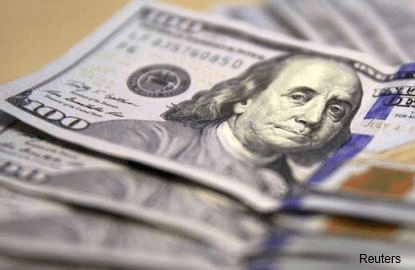
LONDON (March 17): The US dollar hit five-week lows against its peers on Friday, in the wake of the Federal Reserve's cautious message this week on the outlook for interest rate hikes and on concerns over a protectionist slant to a G20 meeting this weekend.
Although the US central bank delivered an interest rate increase on Wednesday as anticipated, it did not alter its earlier forecast for a total of three rate increases this year.
That disappointed US dollar bulls who had hoped for hints of a possible fourth hike in 2017 and for more aggressive forecasts for next year, and sparked the US dollar's weakest three days since last August.
The dollar index, which gauges the greenback against a basket of six major rivals, fell 0.2% to 100.29 after touching 100.16, its lowest level since Feb 9. It was down more than 1% overall for the week and as much as 1.5% since the Fed hiked rates on Wednesday.
"The dollar has been on the defensive since the Fed meeting," said Valentin Marinov, head of FX strategy at Credit Agricole in London.
"But the primary driver (from here) is going to be what's going to transpire at the G20 meeting more than anything else, where the US will reiterate its stance that it's trying to make sure it gets fairer trade."
The discussion of G20 financial leaders in Baden Baden will be among the closest watched by the currency market for years, with any hints of a broader push by Washington against the strength of the US dollar likely to weaken the currency.
A draft communique for the meeting on Friday contained no reference to rejecting protectionism, but it did reiterate a commitment to avoiding competitive currency devaluations.
German Finance Minister Wolfgang Schaeuble told Reuters in an interview published on Friday that the protectionist stance of the Trump administration could complicate the talks and force policymakers to leave out the disputed trade issue.
President Donald Trump meets with German Chancellor Angela Merkel on Friday at the White House.
Against all of that are the broad expectations that a strong US economy, and President Trump's moves on tax and spending later this year, should support more gains for the greenback.
"Investors won't be completely embracing the idea of buying dollars just yet," Marinov said.
In a morning of choppy trade, the recently resurgent euro was up 0.1% at US$1.0779. Against the yen, the US dollar edged up 0.1% to 113.37, still down 1.2% for the week.
Dealers in Japan said the yen could face pressure from a domestic scandal involving a land deal that is chipping away at the government's support ratings. Japanese Prime Minister Shinzo Abe has so far denied first-hand involvement.
"Some market participants may worry about Abe's scandal.... Currently, we just have rumours, and are waiting to see what happens," said Masashi Murata, senior strategist at Brown Brothers Harriman in Tokyo. "The risk that it could eventually lead Abe to resign seems quite small, but is not zero."